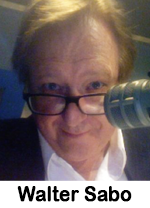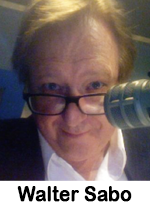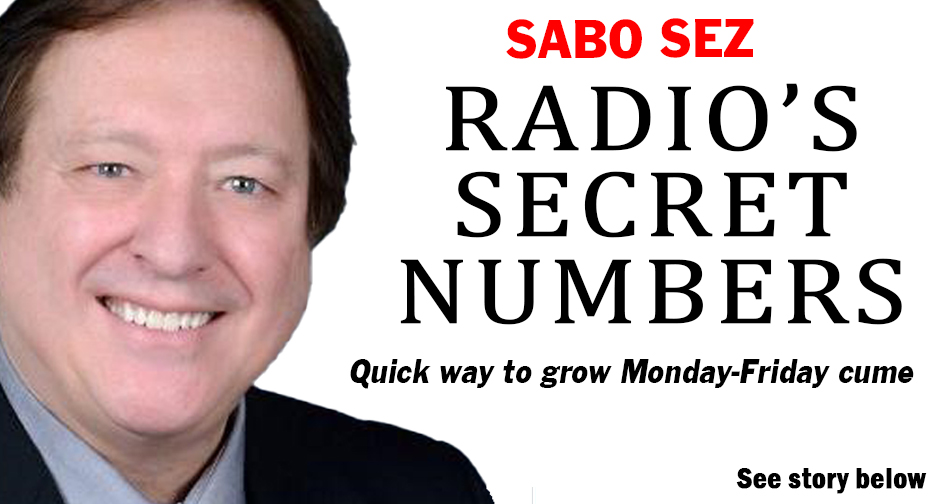Don’t Leave Cash on the Nightstand
By Walter Sabo
Consultant, Sabo Media
A.K.A. Walter Sterling
Radio Host, Sterling On Sunday
Talk Media Network
 Amazing fact: In ancient times, from 1962-1972, the highest-paid on-air talent in New York City was “an overnight guy.” He was paid salary plus sales response. I’m talking about Long John Nebel on WOR, WNBC, then WMCA. Long John’s live reads moved product because his audience was captive. One-to-one his listeners were attached to their radios in the truck cab, night watchman’s building lobby, parents pacing with their babies, students cramming. His background was not in radio; he was a skilled auctioneer. Obviously, the same listeners exist today – and are anxious for someone to talk to them. Check out this old clip of Nebel in action: https://youtu.be/wYMCkpYFtbk
Amazing fact: In ancient times, from 1962-1972, the highest-paid on-air talent in New York City was “an overnight guy.” He was paid salary plus sales response. I’m talking about Long John Nebel on WOR, WNBC, then WMCA. Long John’s live reads moved product because his audience was captive. One-to-one his listeners were attached to their radios in the truck cab, night watchman’s building lobby, parents pacing with their babies, students cramming. His background was not in radio; he was a skilled auctioneer. Obviously, the same listeners exist today – and are anxious for someone to talk to them. Check out this old clip of Nebel in action: https://youtu.be/wYMCkpYFtbk
One of today’s bizarre misconceptions is that overnights/late nights are not important for sales or audience share. Totally and completely wrong!
— As an executive, when launching a new format, any new format, the first time period I staffed was overnights. Late-night, overnight is the doorway to a station. Listening patterns to AM drive are habitual, hard to change. Late night listening is discretionary. Audiences will sample new radio offerings when they seek pure entertainment rather than essential utility elements.
— Late-night cume feeds morning drive. Study the flow of audience from late-night to morning drive, you will be surprised how much of the AM drive cume depends on the last station heard before turning off the radio.
— No distractions. It is easier to sell any product or idea to a person who is giving you 100% of their attention rather than rushing to work, calming the kids and remembering to avoid road construction. As George Noory’s success confirms, the percent of listeners who act on a commercial message is higher overnights than at any other time period.
— Every format has a default hour – one hour of the day when it will have its largest audience share. For all-news, for example, it’s always 5:00 am – 6:00 am. Lite FM’s, 1:00 pm. Live, local talk: 11:00 pm. Listeners seek companionship, sympathy and empathy from talk shows. If a station offers a “best of” at 11:00 pm, it is ignoring the built-in strategic advantage of the talk format. 11:00 pm is primetime.
— Rate integrity. A station may charge top dollar for morning drive. Upon further study those high rates usually come with nighttime bonus spots. Bonus spots cut the rate in half. The nighttime results story can stand on its own and command premium pricing without bonusing.
Walter Sabo was the youngest executive vice president in the history of NBC. The youngest VP in the history of ABC. He was a consultant to RKO General longer than Bill Drake. Walter was the in-house consultant to Sirius for eight years. He has never written a resume. Contact him at walter@sabomedia.com. or mobile 646-678-1110. Hear Walter Sterling at www.waltersterlingshow.com.



 program two legendary news/talk stations. Energy, enthusiasm, attention to detail and experience in news writing/delivering and talk show hosting is a necessity. You must have the ability to interact with listeners and handle multiple phone calls at one time. You will be responsible for all aspects of programming including managing and motivating on-air staff, imaging, station strategy, developing and executing revenue generating sales & programming promotions, website & social media, digital content and have a strong understanding of the core audience of a news/talk format. The position also requires a daily AM drive air-shift, along with live appearances and live broadcasts!
program two legendary news/talk stations. Energy, enthusiasm, attention to detail and experience in news writing/delivering and talk show hosting is a necessity. You must have the ability to interact with listeners and handle multiple phone calls at one time. You will be responsible for all aspects of programming including managing and motivating on-air staff, imaging, station strategy, developing and executing revenue generating sales & programming promotions, website & social media, digital content and have a strong understanding of the core audience of a news/talk format. The position also requires a daily AM drive air-shift, along with live appearances and live broadcasts!  Oh, excuse me, hold on. Here it is! The hourly report from quasi research companies or real research companies like Nielsen declaring that radio is just fine, thank you! Massive surveys (choose one) reveal that radio works! Radio appeals to younger demos! Radio moves product! Radio has more listeners in AM drive than the “Tonight Show” has viewers! A landslide of data proves that after 100 years of success, radio is a viable medium.
Oh, excuse me, hold on. Here it is! The hourly report from quasi research companies or real research companies like Nielsen declaring that radio is just fine, thank you! Massive surveys (choose one) reveal that radio works! Radio appeals to younger demos! Radio moves product! Radio has more listeners in AM drive than the “Tonight Show” has viewers! A landslide of data proves that after 100 years of success, radio is a viable medium.
 Every radio sales presentation should start with one powerful number. This number – often found under the Sphinx – will dazzle any buyer, but is rarely revealed. The number is Homes Using Radio (HUR). Once upon a time it was part of the conversation. HUR shows how many people are using radio at any given time, a total number.
Every radio sales presentation should start with one powerful number. This number – often found under the Sphinx – will dazzle any buyer, but is rarely revealed. The number is Homes Using Radio (HUR). Once upon a time it was part of the conversation. HUR shows how many people are using radio at any given time, a total number.